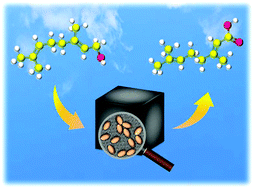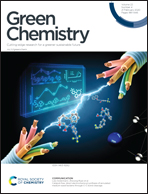Gas-phase bioproduction of a high-value-added monoterpenoid (E)-geranic acid by metabolically engineered Acinetobacter sp. Tol 5†
Abstract
Gas-phase bioproduction, in which immobilized biocatalysts are employed and chemical reactions are performed in a gas phase, has attracted researchers’ attention as a green process. However, there is difficulty in the employment of whole cell catalysts for gas-phase bioproduction due to the lack of a suitable cell immobilization method. Acinetobacter sp. Tol 5 is a unique bacterium, which is remarkably sticky and can be easily immobilized onto various material surfaces through the adhesive bacterionanofiber protein AtaA. In this study, we demonstrate the gas-phase bioproduction of (E)-geranic acid (GA), a high-value-added monoterpenoid, from geraniol using immobilized Tol 5 transformant cells, into which a gene involved in a (E)-GA synthetic pathway was introduced. Time course analysis of the liquid-phase bioproduction of (E)-GA revealed the inherent metabolism of Tol 5 involved in the degradation of (E)-GA. By disrupting the fadD4-ortholog gene, which encodes a key enzyme of the (E)-GA degradation, we successfully generated a (E)-GA-accumulating strain, Tol 5 ΔfadD4 (pGeoA). The immobilized cells of this mutant strain on a polyurethane support enabled the production of (E)-GA with a passive supply of gaseous geraniol in a batch gas-phase reaction. A major fraction of the (E)-GA, which was produced, was adsorbed onto the polyurethane support but easily extracted into ethanol, a safe solvent without environmental impact. This is the first example of gas-phase bioproduction of a complex and high-value-added compound. Tol 5 is a highly promising platform for gas-phase bioproduction.



 Please wait while we load your content...
Please wait while we load your content...